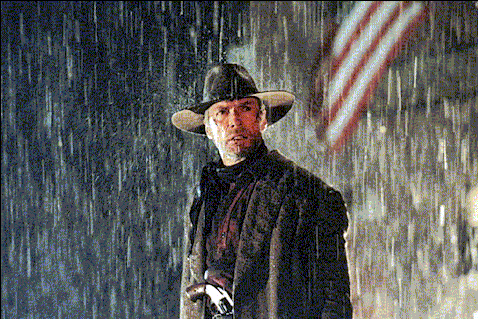 Unforgiven
Unforgiven
 Unforgiven
Unforgiven

Roger Ebert Review:
Clint Eastwood's UNFORGIVEN opens with a shot of the hero, William Munny, standing at the graveside of his wife. The shot is similar to one with John Wayne in John Ford's SHE WORE A YELLOW RIBBON. Given Eastwood's familiarity with classic Westerns, it may be a deliberate echo. Women in Westerns have always been a civilizing influence on the violence of the frontier, bringing schools, churches, white picket fences, and apple pies. Men in the West, left to their own devices, imagine and create such a violent world that they can hardly leave the house unarmed.
William Munny was once, we learn, a gunfighter, and not a very nice one. He killed not simply bad guys, but also women and children, and he doesn't feel very good about that. Now he is trying to support his motherless family by working as a hog farmer, and when the word comes of a $1,000 bounty on the heads of two cowboys who have carved up a prostitute, he accepts the challenge. He needs the money, and perhaps he is attracted to his old ways.
The prostitute was attacked in Big Whiskey, Wyoming, a town ruled by Little Bill Daggett (Gene Hackman), a sheriff who mirrors Munny's own ambiguity about violence and domesticity. Daggett does not permit firearms in his town, and tries to settle disputes peaceably. In adjudicating the brawl at the brothel, for example, he orders the two cowboys to give the saloon owner a couple of horses, in lieu of damages. This is justice of a sort, although not, of course, for the scarred young prostitute, who is treated like so much property. An older hooker (Frances Fisher) is enraged, and raises the money for the bounty on the cowboys.
Like the traditional Western it is, UNFORGIVEN sets up this situation in detail and at leisure. We sense in the first few minutes that the plot will lead up to a final violent test of William Munny and his partners. And in a Western like this, that means their personalities and characters will be tested; unlike the new violent urban adventures, Westerns place greater weight on the meaning of gunfights and deaths. They aren't simply stunts, providing a moment of activity before being quickly forgotten.
Munny is told about the bounty in the first place by a kid (all Westerns seem to have a kid) named, inevitably, the Schofield Kid and played by Jaimz Woolvett. He's too nearsighted to shoot straight, and knows he needs help. Munny in turn recruits an old partner, Ned Logan (Morgan Freeman), and they ride into Big Whiskey, only to discover that another famous gunfighter, English Bob (Richard Harris), has also arrived on the scene.
English Bob is trailed by a writer for pulp Western magazines (Saul Rubinek), who interviews the sheriff on his theories about killing, and does research for his report on the impending showdown. His presence essentially signals the death of the Old West, which is in its last days as a reality and its first days as the stuff of legend and entertainment. The movie is filled, in a low-key way, with other inventions and developments signaling the intrusion of the modern.
UNFORGIVEN is not simply about its plotóabout whether William Munny collects the bounty, and about who gets killed in the processóbut also about what it means to kill somebody, and how a society is affected when people get killed. Hackman's sheriff is a key element in developing this theme. He is capable of being likable, sensible, friendly, and even funny, but he also harbors a streak of violent sadism, and uses his badge as an excuse to beat his victims. He looks so peaceable up there on the roof of his house, nailing shingles, but like the "peaceful" town he takes such pride in, he harbors a vicious streak.
Eastwood's direction of the film, with cinematography by Jack Green, doesn't make the West seem particularly scenic. A lot of the shots are from the inside looking out, so that the figures seem dark and obscure and the brightness that pours through the window is almost blinding. The effect is to diminish the stature of the characters; these aren't heroes, but simply the occupants of a simple, rude society in which death is an everyday fact.
Eastwood bought the story for this movie years ago, and sat on it, he says, until he was old enough to play it. Indeed, all four of the major actors in the film (Eastwood, Hackman, Freeman, and Harris are on the shady side of sixty, and the enormous success of UNFORGIVENóboth at the box office and in the Academy Awardsóindicates that somehow this theme, of older men still trapped in a dance of death, rang a bell. The only way to criticize a movie, Jean-Luc Godard once wrote, is to make another movie. For Clint Eastwood, one of the most intelligent and self-aware of filmmakers, UNFORGIVEN may have been a reaction to the rising tide of meaningless violence in films and on television. In a way, this is a movie about how, when you kill someone, they're really dead.
View The Classic Archive
Home